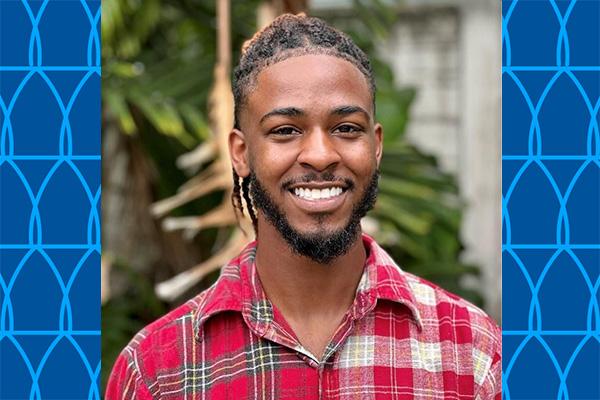
Griffin Carter has been involved with the BioCoRE program for several years, crediting the program with being an integral part of his success as a PhD candidate in the Molecular Genetics and Microbiology program at Duke. BioCoRE’s mission is to increase diversity in the biosciences, and Griffin doesn’t take his role lightly as a leader helping to recruit future scientists into the program.
In this month’s spotlight, Carter discusses the importance of diversity in the sciences, which he says propels new therapies and is essential to finding solutions to medical problems. He also shares how through his research, he’s working to give hope to people with a deadly brain cancer. And we learn about his love of cooking, painting, and helping friends find relief from the stressors of graduate school.
You currently serve in leadership positions in the BioCoRE program, which is committed to increasing diversity of scientists in the biosciences. What is your role within the program? What motivated you to get involved?
My role within BioCoRE is currently serving on the recruitment committee and as the chair of the retreat committee. I am tasked with helping recruit the next cohort of amazing and talented scientists to join the community of BioCoRE. This is a huge task and not one that I take lightly because each BioCoRE scholar represents everyone who comes before and after them. That is a huge burden, and those who are selected to be part of BioCoRE should be proud of that accomplishment. I know I am!
I am also the chair of the retreat committee and was the chair last year as well. I oversee running a team of other scholars with the help of our chair Dr. Debra Ragland to plan and facilitate a weekend of programming in another part of North Carolina to help our students create a bond with each other while also bettering themselves in the space of graduate school to make sure they are succeeding in their research.
Why is it important to have diversity in the biosciences?
I think it is important to have diversity in the biosciences simply because everyone shares different experiences from where they grew up to what they have gone through. Diversity is so often thought of as based on race, and while that is a major part of it, diversity of other things like age and thought are essential for coming up with new solutions to solve different problems that arise in the scheme of medical research. Diversity of individuals in the science is what is going to propel new therapies to treat different problems. I take my research seriously and treat it like I am working towards saving lives for people who may not have hope.
What is the focus of your research as a PhD student? Does it inform your work in equity, diversity, and inclusion (EDI)? If so, how?
I am working on treating glioblastoma multiforme, a deadly brain cancer with no truly effective treatment options. The focus of my research is leveraging an oncolytic virus called PVSRIPO to selectively target certain immune cells in the brain and in turn activating those cells to create an immune environment detrimental to cancer so that tumor growth is eliminated and reversed. My research does inform my work in EDI indirectly because being a person of color, health outcomes are generally worse for us due to socio-economic status and other environmental factors. I always have this in mind when considering my research.
What attracted you to Duke?
I was attracted to Duke because of the nature of the program I joined. Molecular Genetics and Microbiology (MGM) is a great program with a diverse set of research, and I truly felt I would make an impact on this research if I were to join the labs that I was interested in. I was also attracted to being in Durham, which is a great city that is diverse and welcoming to all types of people. The combination of both drew me to Duke and stood out among the six graduate programs I had to choose from.
What passions or hobbies do you have outside of your graduate program?
I enjoy cooking and just being social in general so going out with friends is always a favorite of mine. If you were to ask any of my friends what I like to do in my free time it would be to hang out with them and make sure we’re all having a good time because graduate school can be stressful at times. I also like to paint and do pottery in my free time and have decorated my entire house and other houses with art that I have made.